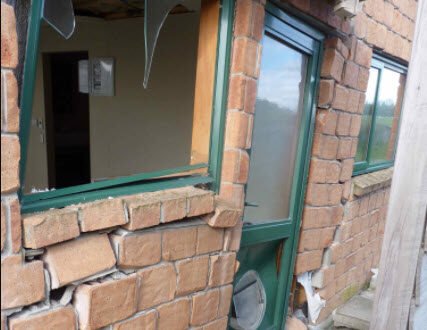Masonry Damage Inspections
Call us: +1-321-355-6052
EMA Masonry Damage Inspections
Masonry damage Inspections are used when there exists masonry forensics problems regionally, but many occur nationwide. Here’s an overview of 10 common construction problems that masonry engineers face during a masonry damage inspection service.
Masonry Damage Inspections in Florida & Texas | Licensed Structural Engineers
What Is a Masonry Damage Inspection?
A masonry Damage inspection is a structural evaluation of brick, block, stone, or CMU (concrete masonry unit) systems. Whether damage is due to weather, foundation movement, or poor construction, a detailed report is crucial for:
Safety assurance during masonry damage inspections
Insurance claims
Real estate transactions for masonry damage inspections
Code compliance
Repair planning after masonry damage inspections
⚠️ Common Signs of Masonry Damage
Step cracks in exterior brick walls
Bulging or leaning walls
Displaced or loose bricks and blocks
Vertical or diagonal cracking near windows/doors
Crumbling mortar joints
Water intrusion & efflorescence
Foundation settlement or heaving
🔧 What We Inspect During Masonry Damage Inspections
Our Florida- and Texas-licensed structural engineers perform:
Visual and structural assessment during masonry damage inspections
Mortar and joint integrity checks
Crack pattern analysis during masonry damage inspections
Moisture penetration mapping
Load-bearing stability evaluations
Each report is sealed by a Professional Engineer (PE) and accepted by municipalities, HOAs, insurance companies, and attorneys.
🌪️ Specialized in Post-Storm & Foundation-Related Masonry Damage
We frequently assess masonry after:
Hurricanes & windstorms (common in Florida & Gulf Coast Texas)
Foundation settlement due to expansive clay (Texas)
Water intrusion and poor drainage issues
Improper construction or renovations
📍 Areas We Serve in Florida & Texas
Florida:
Tampa, Orlando, Jacksonville, Daytona, Fort Myers
Texas:
Houston, Dallas, San Antonio, Austin, Galveston, Corpus Christi, El Paso
🛠️ Repair Planning & Expert Witness Services
In addition to inspections, we provide:
Written structural repair plans
Coordination with masons and general contractors
Expert witness reports for litigation or insurance disputes
Why Choose Us?
✅ Licensed Professional Engineers in FL & TX
✅ 20+ Years of Forensic & Structural Expertise
✅ Accurate, Timely, Code-Compliant Reports
✅ Insurance-Ready Documentation
✅ Fast Turnaround (2–5 Business Days)
✅ Trusted by Homeowners, Attorneys, HOAs & Builders
Related Services (Internal Links)
👉 Structural Engineering Reports
👉 Hurricane Damage Inspections
External Resources (for E-A-T and Trust)
📞 Schedule a Masonry Damage Inspection in Florida or Texas
Don’t wait for visible damage to get worse—or more expensive. Contact our engineering team today to schedule a certified inspection.
📞 Call (321) 355‑6052
📧 Request an Estimate
🕘 Available 7 Days a Week for Emergency Inspections
Meta Title: Masonry Damage Inspections | Florida & Texas Structural Engineers
Meta Description: Get expert masonry inspections in Florida & Texas by licensed engineers. Cracked brick, leaning walls, storm & foundation damage reports. Fast & code-compliant.
URL Slug: /services/masonry-damage-inspections
Canonical URL: https://forensicengineerflorida.com/services/masonry-damage-inspections
H1 Tag: Masonry Damage Inspections in Florida & Texas | Licensed Engineers
Efflorescence Noted During Masonry Damage Inspections
When water containing dissolved salts evaporates from a masonry structure it leaves a salt deposit (Figure 1). The stain is called efflorescence. Salts may be present in all types of masonry materials: mortar, brick, concrete block, stucco, and plaster. Or they may be in water that enters the masonry
Besides being unsightly, efflorescence may lead to more serious problems such as cracking. Salt crystals deposited in pores sometime generate enough pressure to crack the masonry.
To prevent efflorescence, prevent water from entering the wall and provide drainage for water that does. Design properly and install flashing, weep holes, drips, and caulking.
2 PROBLEM In Masonry Damage Inspections


Corrosion In Masonry Damage Inspections
In the presence of water and oxygen, steel rebars in bond beams, grouted cells, or collar joints will corrode. Horizontal joint reinforcement ties that hold multi-wythe masonry walls together, or anchors that attach a veneer wall to a support also are susceptible to corrosion, needing masonry damage inspections mandatory
Rust, the product of corrosion, occupies up to six times the original volume of steel. This volume expansion causes cracks that let in more water and thus cause even more corrosion.
The most common materials used for reinforcing are un-coated steel, zinc-coated steel, and hot-dipped galvanized steel. The coatings and the alkaline mortar provide some corrosion protection. There is, however, no substitute for good tight mortar joints and flashing that minimize the amount of moisture entering and accumulating in the masonry.
Also, avoid adding chloride to mortar or grout; soluble chlorides accelerate corrosion. And don’t install dissimilar metals such as copper and steel in the same wall. When there’s moisture in the wall, dissimilar metals sometimes react and cause corrosion too, masonry damage inspections Florida.